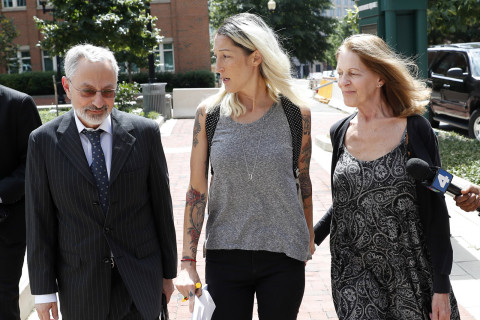WASHINGTON — Law enforcement officials had plans to “quickly” mitigate a potential threat from a Metro Transit Police Officer accused of attempting to send gift cards to the Islamic State group if he had decided to launch an attack on his own, Metro Transit Police Chief Ron Pavlik said Thursday.
“At any point in time, if Mr. Young’s behavior was so escalated to the point where he was going to take action or immediate action, steps were in place to mitigate that as quickly as possible,” Pavlik told a special Metro Board safety meeting.
Nicholas Young, 36, was fired after he was arrested earlier this month. Court filings indicated the Fairfax resident knew two other men who have faced terror charges. Prosecutors accuse Young of sending about $245 worth of gift cards he believed would help ISIS militants communicate with each other.
“The safety and security of our employees and our riders are always our utmost top priority,” Pavlik said. “If Mr. Young ever posed an immediate threat to any of our employees or our riders, plans were in place to mitigate that quickly.”
Asked after the meeting, Pavlik told WTOP those plans included regularly monitoring Young’s social media accounts and any other online posts.
The FBI’s Joint Terrorism Task Force had been tracking Young for years, including various forms of surveillance, after receiving a tip from within the Metro Transit Police Department.
Metro General Manager Paul Wiedefeld said he was briefed on the investigation before he took over at Metro last fall.
“I was very comfortable with what they were doing, what we were doing in that case, and I think it worked out exactly as we hoped it would,” he said.
Young was hired in the spring of 2003, and completed training in December 2003. Young’s performance during his 13-year career was “below average to average,” Pavlik told the Metro Board, but never so poor it would lead to a termination.
Young, however, started displaying behavior “that was just abnormal,” Pavlik said, “or you might find concerning … that raised some concerns.
Generally, in order to be hired, officers must go through a written test and an agility test to qualify for a more extensive review. The next rounds of the process include medical and psychological exams, an interview panel, background checks and a computer voice stress analyzer that is designed to work like a polygraph.
Metro Board Chairman Jack Evans asked whether Young was ever “in a position where he could have done destructive things, asking, “Have we followed him 24/7 for four years?” Evans asked.
Pavlik said the FBI and Metro police worked together and “had means in place that if, again, he posed an immediate risk to any of our employees or our riders. that actions would have been taken swiftly. Unfortunately, investigations of this magnitude take a long period of time,” Pavlik said.
Evans also asked about the chances there are other backers of terror groups at the agency.
Pavlik said neither he nor the FBI were aware of any other officers with links to ISIS.
But he added, “Throughout the law enforcement community, homegrown violent extremists are our biggest threat right now, (and) when you look at the homegrown terrorist-type people, there’s no warning signs, there’s no precursors, so I think the threat of homegrown extremists is always out there.”







